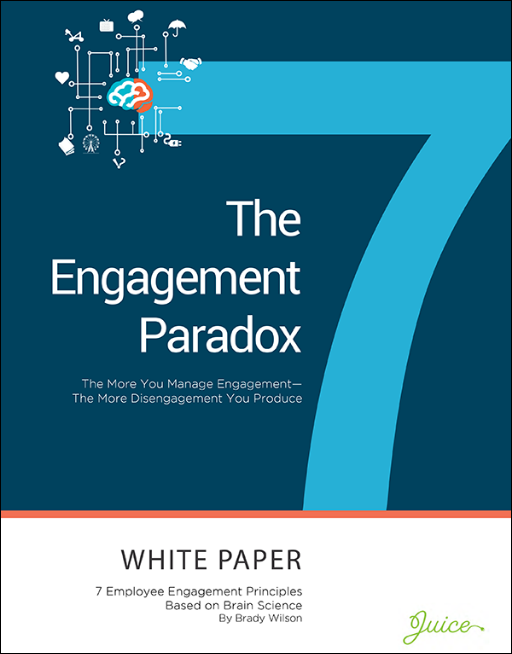
Five Driving Needs: A Guide to Fueling Productivity in the Workplace
Summary
Improving or sustaining team and organizational performance requires that leaders foster an environment where people can deploy their strengths. This article provides you with insights into how creating a culture where people can skillfully get their driving needs met can generate the energy needed to fuel sustainable performance and transform employee engagement.
Sections:
- Power Your Leadership Practice By Leveraging The Five Driving Needs
- How Our Driving Needs Unlock Performance
- What Are The Five Driving Needs?
- Leading With The Five Driving Needs In Mind
Power Your Leadership Practice By Leveraging The Five Driving Needs
Imagine yourself at the end of a powerfully productive day. You became so immersed in your work you lost all track of time. Every task you checked off increased your energy and sense of vitality. By the end of the day, your sense of progress was palpable.
What creates a day like that? One could imagine it was sandwiched between two dismally unproductive days. So what changed?
It wasn’t your talents–they don’t change from one day to the next. Neither was it your education, your experience, or skills; they don’t spike from one day to the next either. And it’s unlikely that gritting your teeth and trying harder left you feeling more energized.
Consider this possibility: That memorable day was the result of an energized brain. Not raw physical energy, but what we call intelligent energy–the ability to sustain focus in the midst of distractions, manage your emotions in high stakes situations, process oceans of information, pick out the vital bits and connect the dots in surprising ways.
At Juice, we hold the preposterous belief that individuals, like you and your people, deserve these powerfully productive days. To have energized brains and have energy left over at the end of the day for your families, your personal pursuits and to contribute to your community. This is how we can collectively create a better world.
You may be surprised to hear that psychological needs–the expression and attainment of them–are one of the biggest determinants of employee energy levels at work. When psychological needs go unmet, we begin to lose energy, which results in disillusionment, disengagement, ongoing fatigue and, over time, burnout. When those psychological needs are met, however, it has the opposite effect: energy is renewed and restored. As a leader, then, it becomes critical to manage energy, not engagement.
If the thought of psychological needs in the workplace has you fearful or uncomfortable, read on! It’s not as scary as you might think and it may just be the secret to unlocking the full potential of your team.
How Our Driving Needs Unlock Performance
Just as humans have basic physical needs, we also have an array of psychological needs. These needs (whether we like it or not) are essential, primal and biologically urgent. They are also essential nutrients to human flourishing. Yet, we’ve been socialized to stifle, mask, and repress them.
Fifty years ago, Drs. Edward L. Deci and Richard M. Ryan began exploring what produces vitality in humans. Their work evolved into one of the most prominent theories of human motivation, Self-Determination Theory. According to this theory, when our core psychological needs are fulfilled, vitality and optimal performance naturally occur. Likewise, when they are thwarted, depletion and poor performance naturally ensue.
So, despite these needs being universal, primal and biologically urgent, we rarely talk about them. And, if we’ve been socialized to stifle, mask, and repress these needs in our everyday life, we’ve almost certainly been taught to avoid these conversations in the workplace. Why is that? First, talking about our needs at work can feel taboo and off-limits. Second, you may not feel equipped to talk about sensitive topics like needs with your colleagues at work.
Here’s the rub, though: Stuffing them down or ignoring them doesn’t make them go away. When psychological needs go unfulfilled at work, individuals experience a pervasive energy leak, contributing to feelings of depletion and fatigue, which can, in turn, lead to lower performance and, even illness. At Juice, we call this “Stuffering.” It refers to the suffering caused by stuffing down our needs at work.
The research on this topic, and our work with clients over the past two decades, points to a simple fact: Meeting needs is central to the healthy function and performance of our teams and organizations (and families and communities). There was a day when meeting needs was relegated to the front line–something salespeople and customer service representatives did for customers. It is now impossible to sustain the energy needed to drive innovation, maintain employee engagement, create great customer experiences and sustain overall performance without knowing and meeting needs at every node and nexus of an organization.

The Engagement Paradox
Our white paper, The Engagement Paradox, asserts something quite surprising to leaders: that while employee engagement is often the primary strategy leaders rely on to get employees to produce a great customer experience, it rarely delivers it. In fact, and paradoxically, employee engagement policies can actually lead to employee disengagement.
Read the white paper to learn about the seven leadership principles, based on brain science, that explain why achieving employee engagement is not enough. It provides links to case studies that demonstrate how organizations have made the shift to managing energy, not engagement—and are achieving superior outcomes as a result.
What Are The Five Driving Needs?
At this point, you may be wondering what these psychological needs are. Drawing from the work of numerous researchers, and 20 years of client work, we’ve identified five needs that are like oxygen for people, that is, they are biologically urgent. These five core needs are:
The need for belonging
The need for security
The need for freedom
The need for significance
The need for meaning
It is important to emphasize we are referring to needs, not preferences or wants. Don’t get us wrong, preferences can serve as valuable information. You’ve likely had numerous personality assessments over the years, providing you with information about your preferences. Perhaps you are more energized working by yourself than you are working with others. These preferences are instructive and helpful to know oneself. For example, “Too much group work drains my energy.”
But the driving needs we’re discussing in this article are fundamentally different from preferences. Unfulfilled, they cause biological panic and ill-being. Fulfilled, they restore and renew us, shaping our reality in ways that preferences never could.
Needs also differ from preferences in their dynamic nature. Needs are constantly changing. They can change from relationship to relationship, or based on circumstance. To illustrate, in 2020, as we were all heading into the pandemic, can you guess which of the needs listed above prevailed? In our client work, we noticed an overwhelming shift in the most self-reported need. You guessed it: Security. Why was that? Circumstances changed. Collectively and individually, we went from a sense of knowing to a sense of absolute uncertainty in a very short timeframe. So it’s not surprising that security became the highest need. Leaders who identified that, and provided a sense of security for their teams, were able to reduce the energy drain.
Let’s take a closer look at each of the Five Driving Needs:
Belonging
Belonging includes relatedness, affiliation, social connection, friendship, acceptance, inclusion, feeling part of the group, close relationships, attachment and kinship.
What’s the worst form of punishment that can be inflicted on a prisoner? Isolation. Why? Because human connection is so vital to our survival that when it is removed, we experience torment. In fact, the research of Dr. Dean Ornish, spanning four decades, reveals that belonging in close social relationships is a greater predictor of our physical health than the quality of our diet, how much we exercise or whether or not we smoke. In short, you’re better to eat poutine with your pals than broccoli solo.
Security
Security includes clarity, order, consistency, predictability, organization, dependable structure, effective systems, fair play, equality and clear expectations.
When our emotional security is threatened, our stress response shifts our thinking from curiosity to judgment, growth to protectionism and partnering to defensiveness. When our relational security is threatened, we don’t fare well either. A 2013 meta-analysis on the topic of destructive leadership found that toxic relational dynamics, especially from leaders who abuse their power (through hostile behaviours such as public ridicule, stealing credit, blaming subordinates, giving the silent treatment, etc.), produce a variety of negative outcomes, including stress, lowered job satisfaction, and decreased performance, for those they lead. When this toxic behaviour is ingrained in an organization’s culture, employees hold negative attitudes not just toward the offending leader, but the organization itself.
Freedom
Freedom includes decision-making latitude, autonomy, agency, adventure, opportunity to take risks, the leeway to prove oneself, and the right to choose for oneself.
Autonomy (acting according to one’s own choices and desires) facilitates intrinsic motivation, which is linked to better performance, learning, and well-being. For instance, a 2012 meta-analysis of 184 studies in a health care context concluded that supporting an individual’s autonomy was linked to positive behaviours, good mental health, and improved quality of life.
Significance
Significance includes achievement, competence, mastery, progress, performance, capability, self-esteem, excellence, quality, status, differentiation from the status quo, being valued and respected, reputation and legacy.
Individuals have a strong need to feel worthy as a person. This positive self-evaluation, known as self-esteem, is partly dependent on being seen by others as valuable (Pyszczynski et al., 2004). Through recognition, acknowledgement, and achievement, people gain a sense that they are valuable to others.
Meaning
Meaning includes purpose, contributing to a cause, pursuing the greater good, seeking justice, making a difference, and altruism.
Engaging in meaningful work deeply energizes people. And even when meaningful work is not possible, people can still find meaning at work and be energized by that. Studies have also found that people who reported a sense of meaning were less likely to suffer from stress, anxiety, and depression, felt greater life satisfaction, and experienced increased endurance during mental and physical challenges. When your employees experience a state of being where they feel highly connected, safe, autonomous, significant and purposeful, their brains are liberated from the interference of rejection, threat, control, disrespect and futility. This frees up brain capacity and allows them to deploy their strengths and perform at their best.
What is Interference?
Interference is the psychological disruption that occurs when we are faced with an unmet need. This interference gets in the way of our performance by blocking or limiting the very juices that fuel our abilities. As it blocks the juices from flowing, it depletes our energy reserves. The goal is to remove, or at the very least minimize, interference in the workplace.
Leading With the Five Driving Needs in Mind
As a leader, you can transform the workplace experience for yourself and your employees by understanding the Five Driving Needs and learning how to enter into productive and genuine dialogue with employees about their needs. Here’s a story from one of our clients demonstrating the powerful shift in performance by leading with the Five Driving Needs in mind.
Case Study: From Under-Wowing to Team Captain
A bank manager wanted one of her employees to up his game and do more selling in the credit card part of the business. At first she thought he just lacked product knowledge, so she began educating him about the product. But she soon discovered that was not the issue. She then thought, “He must lack confidence”, and began helping him with his self-talk and perceived lack of confidence. Wrong again. “He probably just lacks motivation,” she concluded. “I’ll help him see how good he’ll feel when his name is at the top of the weekly productivity report.” Strike three.Then she did something that all great managers do. She asked him, “What matters most to you in your job?” The answer was immediate: “Connection with my colleagues—feeling a sense of belonging and inclusion with the team.”
This piece of information changed the bank manager’s entire approach. She asked the employee if he would be the team captain of credit card sales, sharing his knowledge with the rest of the team, tracking sales and reporting successes in weekly team meetings. And what happened to his credit card sales? They grew significantly. Not only that but his excitement for credit card sales (happily) infected the entire branch.
Tension existed between the belonging and connection the employee wanted, and what he was currently experiencing. Inside that tension was energy ready to be unlocked.
The ultimate solution had nothing to do with asking the employee to come in early, stay late or work through lunch breaks. All that was required was to tap into that tension to unlock free energy. This fuelled the performance of the entire team. But that’s not surprising—because energized employees always get better results.
By entering into a conversation about her employee’s needs, the bank manager was able to unlock his potential and set him up for optimal success. He now feels energized, motivated, and is performing better than ever. This demonstrates the power of bringing an end to “Stuffering” and talking about our needs so we can ultimately achieve what we all want: to be energized and to contribute at our highest level at work and at home.
Our Partnering framework can help you have conversations like these with your employees, to understand their needs, connect on what matters most, and unlock performance. These conversations don’t need to be lengthy or complex. In fact, quite the opposite! Through intentional conversation, you can uncover the one or two needs that matter most of all to each of your employees (their “dealbreakers”), and begin managing their energy, not their engagement. It’s also important to have these partnering conversations on an on-going basis because the Five Driving Needs are dynamic and can shift as our life or work circumstances change.
Valued and Respected Shows Up Most of All
When we work with a group, we play a game we’ve developed called Oxygen Poker, which helps participants identify their driving needs. For each of the Five Driving Needs, there are five more specific sub-needs, for a total of 25 cards. From those 25 cards, participants are asked to choose five, and rank them in order from most to least important to them. The data, from thousands of participants, is very clear: “Valued and Respected” is the card most often chosen as critical, or as a “deal-breaker.” Leaders take note: Creating a culture of value and respect directly contributes to the success of your team.
Remember, powerfully productive days are the result of energized brains, and brains are energized by the pursuit and fulfillment of driving needs. By connecting with your employees, understanding what matters most, and leading with needs fulfillment in mind, you’ll unlock energy in your employees which, in turn, will unlock performance. If you’re interested in learning how to partner with your employees to optimize your team’s performance, reach out to learn about our programs.
Your content is only one click away.
Thanks for your interest in our content. We hope you find value in the time you invest with it. Click the button below and get immediate access to this truly valuable content.
Complete the form below and get instant access to this game-changing content.
Rest assured, we take your privacy seriously and will never sell, trade, or share your information with a third party.



